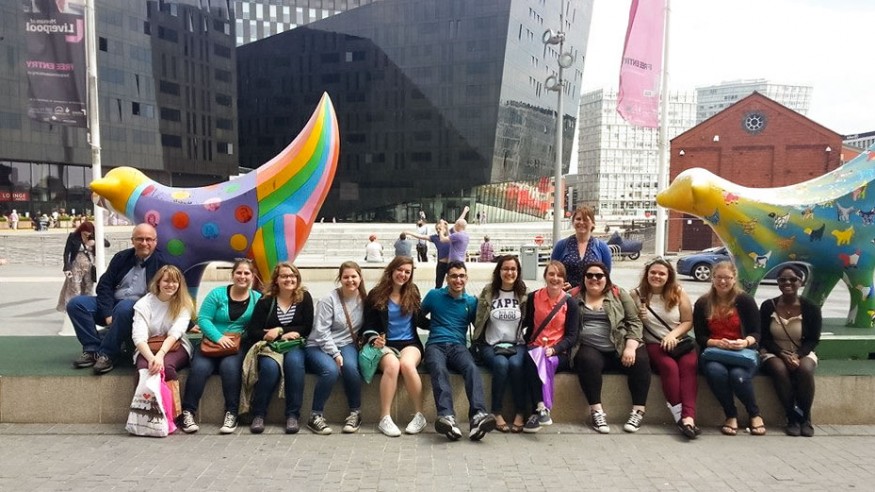
Travel-Learning Course, ‘Re-Placing Great Britain: Alternative Narratives of National Identity’
Learn how OWU’s Course Connections, Travel-Learning Courses, Theory-to-Practice Grants, and other programs prepare students for global citizenship and leadership and help them…Make the Connection.
Led by English professor Nancy Comorau, OWU students spent a semester reading poetry and prose by black British and postcolonial authors and then traveled to London, Liverpool, and Manchester to explore the black British and postcolonial arts scene and examine the ways in which the UK represents its national identity to visitors. (Photo courtesy of Nicole Nitti ’16)
Morgan Christie ’16
Name: Morgan Christie ’16
Major: Psychology
Minor: French
Hometown: Mansfield, Ohio
Experience: Travel-Learning Course, ‘Re-Placing Great Britain: Alternative Narratives of National Identity’
Lessons Learned:
“In class, we read the narratives of black Britons and were able to build a knowledge base of what life was like in Britain during the post-Windrush era (a time of mass immigration). We were able to see how the subjective experiences of those living in Britain at this time were not only heavily influenced by the emotionality of immigration, but also by the discriminatory nature of the era.
“The idea of having a ‘national identity’ is far more complex and nuanced than it seems on the surface, and this course challenged the idea of what it means to be British.
“Perhaps the most important lesson I learned from this trip is the danger that comes with ‘misremembering’ history. Our trip explored the area of Liverpool—a city built on the slave trade. We saw the ports used for slave ships; we saw shackles that were placed on slaves as symbols of ownership from slave masters; and we saw the symbols of the slave trade literally carved into the architecture of the city.
“But we also saw the International Slave Museum—which illustrated the chronology of the slave trade from its very beginnings to the abolitionist movement—focused mainly on the slave trade in America. The museum, based in Liverpool, was essentially cutting its associations with the slave trade and placing the responsibility of taking part in the slave trade on another entity. Accurately representing the slave trade in a British context would have allowed the museum to properly represent the atrocities of the slave trade, instead of grossly misrepresenting history—an injustice to all.
“An experience like this matters because the issues you read about in class do not end when the book is closed or the exam is taken. Instead, these issues are still available for exploration and thought. Expanding your knowledge in the context of travel is extremely rewarding in terms of closing the gap between the classroom and the real world.”
Nicole Nitti ’16
Name: Nicole Nitti ’16
Major: Management Economics
Minor: English
Hometown: South Orange, New Jersey
Experience: Travel-Learning Course, ‘Re-Placing Great Britain: Alternative Narratives of National Identity’
Lesson Learned:
“Not unlike many Americans today, I used to associate England with a very rich history—and while this history spanned centuries it was predominantly white. This course focused on studying narratives that challenged this perception of England. I have been able to assess my ideas about the UK and its inhabitants, but more specifically I’ve learned that national identity is not pure and concrete—it is rather a sum of different places, cultures, and experiences.
“Going to England provided me with the opportunity to see the issues we had discussed come to life. From critically studying museum exhibits on slavery, to visiting culturally significant neighborhoods like Brixton, and so much more, the activities on this trip enabled me to gain an incredible amount of insight into how the UK and its inhabitants represent themselves.
“Our walking tours of Liverpool, Notting Hill, and Southall expanded my knowledge because I was able to see how national and immigrant identity is manifested through place and space—which is something I could not have learned as effectively in a classroom setting.
“Our tour guide in the Southall neighborhood of London said to us that ‘everyone comes from somewhere else.’ This statement resonated with me because it really is the core of the literature, the histories, and the places we have learned about. I’ve realized that integrating my classroom and travel experiences in ways that are meaningful is crucial, and I am incredibly thankful for the opportunity to do so.”
